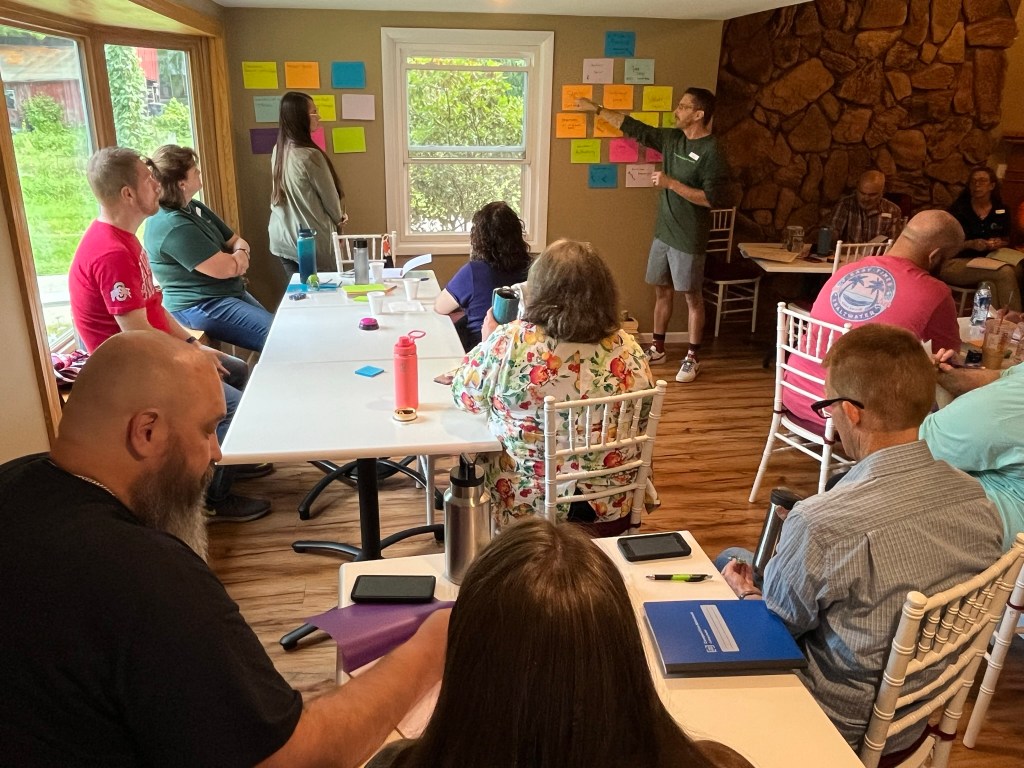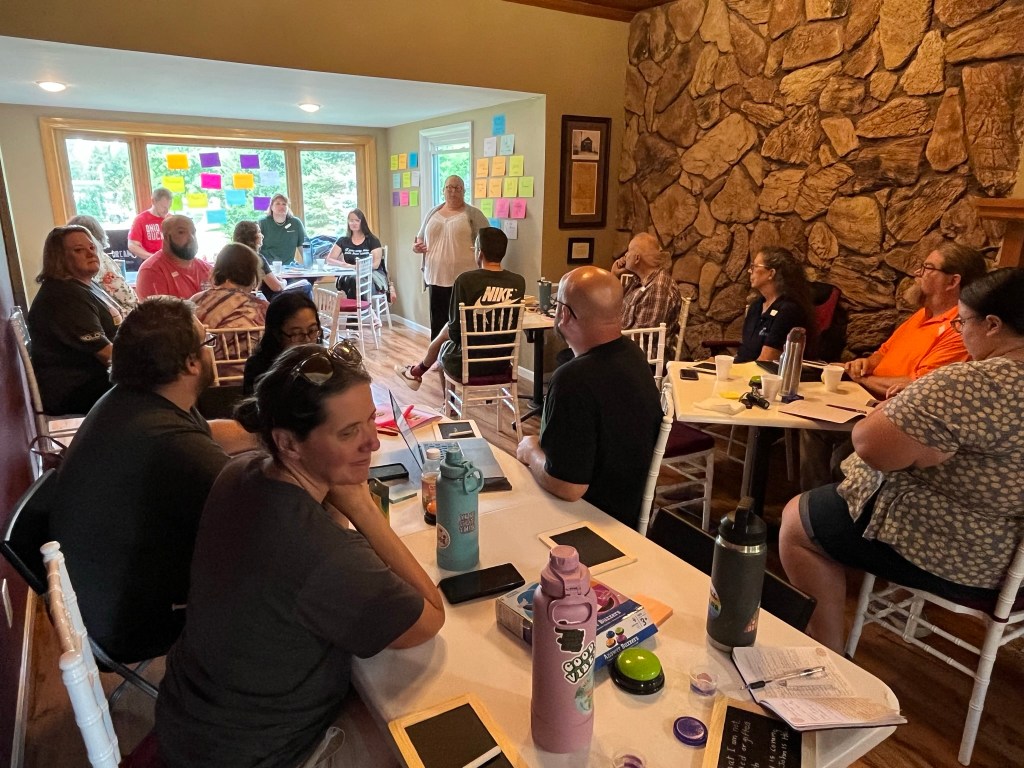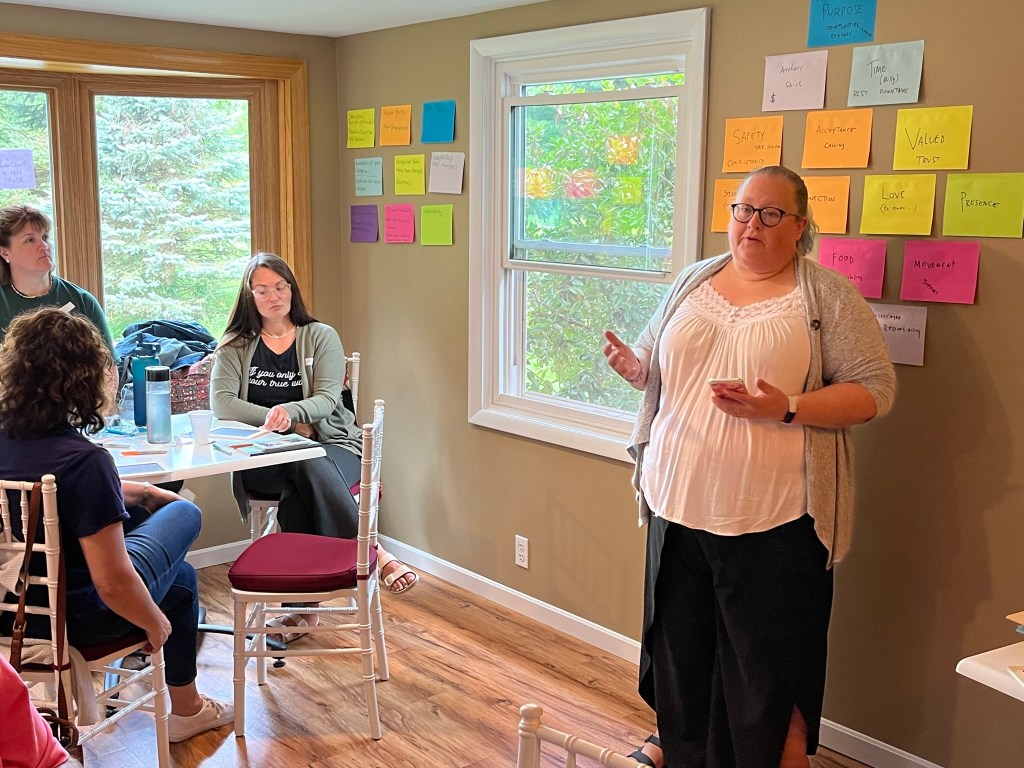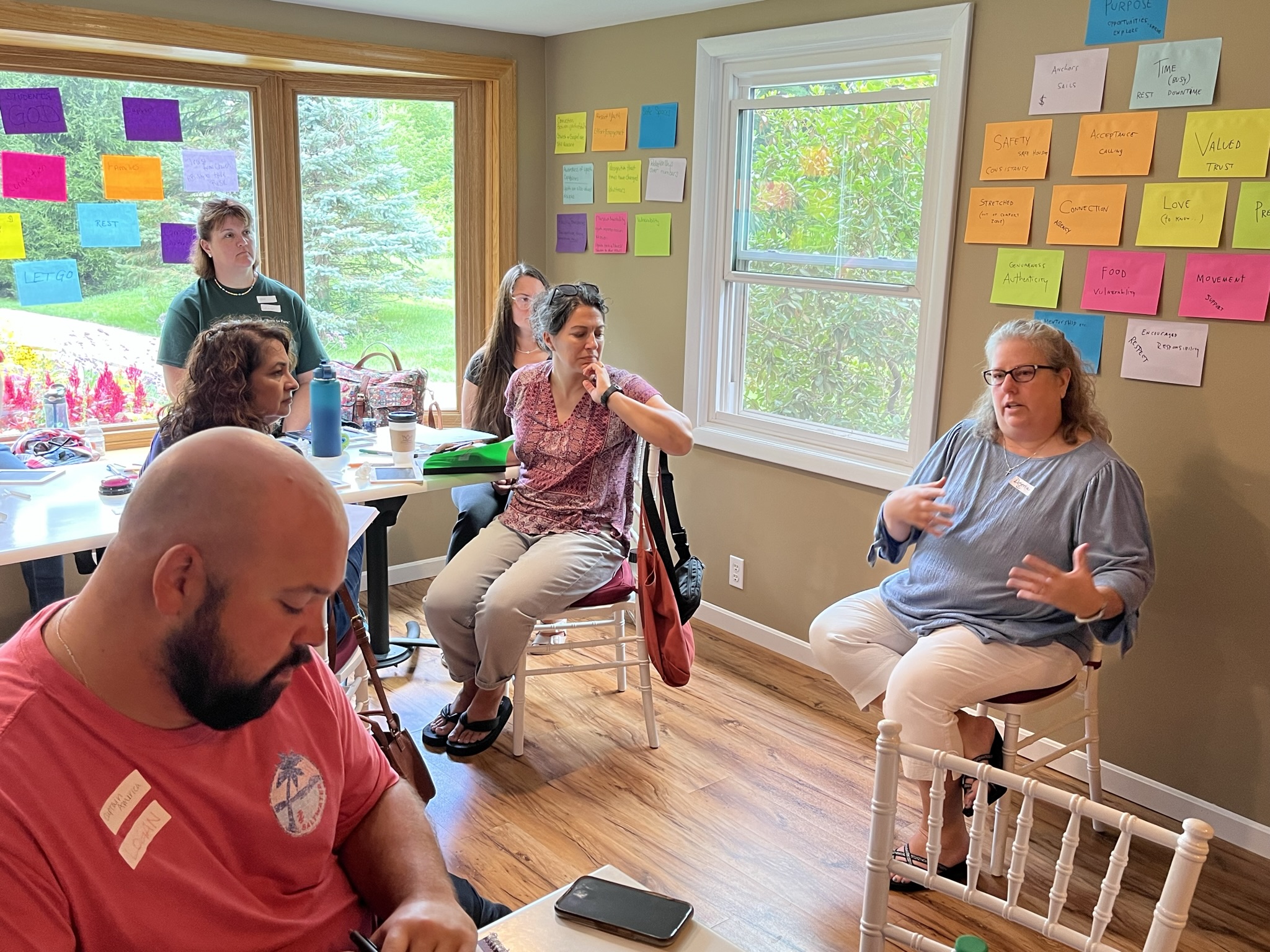By Rick Wolcott*
“Forget the former things; do not dwell on the past. See, I am doing a new thing!Now it springs up; do you not perceive it? I am making a way in the wilderness and streams in the wasteland.” – Isaiah 43:18-19 (NIV)
Youth ministry is vital to the church of today and the church of the future, and being able to reach, teach, and learn from young people is a key component in our shared East Ohio Conference vision for living into the mission of The United Methodist Church. That vision calls for us to be disciples, make disciples, and mature disciples of Jesus Christ, transform lives and communities, and reach new, diverse, and younger people.
On Saturday, August 26 dozens of youth ministry leaders took part in Re-imagining Youth Ministry in a Post-COVID World. The resourcing event was a day of prayer, connection, conversation, and focusing on what could be instead of on what was led by Connectional Ministries office Young People’s Ministries Co-Directors Pastor Christy Suffecool and Tim Beck.
“We all recognize that there are some great needs in our churches and that it’s not easy, especially in this post-COVID age to be in youth ministry or any kind of ministry because things keep changing. This is our time to connect with each other and connect with God and to challenge each other to re-imagine what youth ministry might look like in our context of The United Methodist Church moving forward,” said Beck to the lay and clergy participants, whose churches are located across eight of the 10 districts of the East Ohio Conference.

“I think we all know the more connected we can become there is strength in our connectedness and when we strive to do new things, we can encourage each other. And we don’t just do new things for the sake of doing a new thing, we are called to the new thing because we have been in the midst of a trial and there’s no other way to go but forward,” Beck said.
During the six-hour event, participants sat in groups around tables inside the L-shaped room of the Trolley Line House in Wadsworth.
“There is a bell or buzzer on each of your tables,” Suffecool shared. “If you hear your peers say, ‘well we used to do …’ or ‘this is what we’ve always done’ ring the bell. This is our way of holding each other accountable that we’re trying to break that mindset and today is about looking to the future and new ideas and not being held back by the past anymore.”
In May’s announcement of Beck’s hiring and Suffecool’s appointment to their positions, which were effective July 1, Executive Director of Connectional Ministries Rev. Ed Fashbaugh stated, “the primary mission of Tim and Christy’s work is to resource and assist local churches, districts, and the East Ohio Conference in assessing and removing the barriers to the full inclusion of young people in the life and ministry of the Church. They will also assist in developing strategies and resources for leadership development training, continue building upon existing Young People’s Ministries networks and teams, and ensure the resources of Conference Council on Youth Ministries (CCYM), Young Adult Ministry, and the Board of Higher Education and Campus Ministry align with the shared vision of the East Ohio Conference and the mission of The United Methodist Church.”
During the Re-imagining Youth Ministry event Suffecool shared that she and Beck are aided by a youth leaders’ network.

“The purpose of the network is connecting with each of you. Tim and I can’t make it to all 400 churches on a frequent basis so across the Conference we have people who have agreed to step up and be a regional coordinator. So, it’s your person to connect with. We meet with them regularly and they give you another resource in addition to Tim and me,” she said.
Anne Horvath, a regional coordinator from Willoughby Hills UMC (Western Reserve District) told participants, “We just want people to connect. So, any of us will connect with anybody. We serve in regions just because of travel, like if we’re getting together for coffee, it’s easier if we are closer together.”
Identifying Needs
Following an icebreaker designed to get participants to interact with those in the room that they did not know, the work of determining current realities and identifying what is needed to move forward began. The answers, shown below in italics, that clergy and lay youth ministry leaders provided to the following questions were written on large Post-it Sticky Notes that covered a wall and a large window in the room, visual reminders of the work that lay ahead.

What do students need most?
- Acceptance
- Both an anchor and sails
- Purpose
- Connection
- To know they are loved
- The Gospel
- To be stretched outside their comfort zones
- Opportunities to learn their call and live into their faith
- To be encouraged to have responsibility
- Trust
- The capacity to choose for themselves
- To be heard and validated
What do our churches need most in relation to youth ministry?
- Youth to be in church
- Intergenerational connection between adults and youth
- To see that youth are capable and they don’t need their parents doing things for them
- To understand that the life of a youth today is much different than the life of a youth in 1960
- Healthy boundaries and safe spaces
- Emphasizing relationships over numbers
- Understanding that our churches are to be used and not treated as museums
- Parents being engaged and not just transporting their child to and from church
- Volunteers
- Creating meaningful purpose for the youth and including them on every committee
- Having courage to take risks and being encouraged to fail
- Understanding that youth are not going to solve all of a church’s problems
What do you as youth leaders need most?
- Vulnerability
- Support
- Trust from the church to take risks and think outside the box
- Financial resources
- Families
- Connection and collaboration
- Rest
- Being stretched to be present for students on their turfs – outside the church walls
- The transformative power of God
- To let go
- Buy-in to try something new and freedom to fail
Letting Go and Doing a New Thing
Beck shared that the old mindset in youth ministry of students just showing up at the church for youth group doesn’t work anymore.
“The biggest challenge for us – and this is why we are here – is that we can just let go. It’s so hard and we have so much pressure put on us, from ourselves and others, but to be able to let go from the way it used to be and to just dream about the way it can be is critical,” he said.
Deena Wolfe, a regional coordinator from Dover First UMC (Tuscarawas District), then shared how the students in the youth group she leads benefited from not being able to self-select the kids they hung out with at Youth Annual Conference (YAC) in June.
“It all began with Youth Annual Conference (YAC) in June,” stated Wolfe. “They weren’t allowed to choose the other youth they spent the day with, but that ended up being a good thing because they met youth from another church. Then in July when we got on the bus to go to YOUTH 2023 in Daytona Beach with 53 people from the East Ohio Conference and the West Ohio Conference, they saw one of the young people they had met at YAC, and they felt comfortable. By the time we got to our first stop in Charlotte for mission work they were all best of friends. They still text each other and have group chats set up on social media platforms.”


Next, Rev. Joe Burkhardt, pastor of Wedgewood UMC and Akron First UMC (Canal District) and father of seven, offered a key to connecting with students in creative ways outside of the church – something he lives out daily with the friends of his children who hang out in their home.
“I’m telling you the absolute, baseline, by far most important thing to do is a severe attitudinal shift around hospitality which centers on whoever ‘the other’ may be to create space for whoever takes the risk to walk in,” he offered. “The things that we do matter, but they matter most when we start with an attitude that says, ‘how do I make the other person know that he or she or they are absolutely welcome as they are?’”
Rev. Becky Evanoff, now in her second year as pastor of Northampton UMC in Cuyahoga Falls (Canal District), then gave an example of innovation arising from what she called “survival mode.”
“We started a youth group with five dedicated students who attended every week. One was the friend of a youth in the church and her father is pastor of a Lutheran church in town. He and I started talking about doing an ecumenical youth group. His Lutheran church also hosts a Bhutanese congregation that did not have a youth group. In February the three churches brought our youth together to see if they could work together. The youth are from three churches and five school districts, but they jelled and decided they want to continue meeting together in the youth room at Northampton UMC,” she said. “We meet with different people leading, we did a mission trip together to Canton this summer, and are open to what God’s telling the kids that they want. We now have 15 in the group, and they named themselves the ‘Verge because we’ve all converged together. We’re now reaching out to other churches to see if they need anything and to ask, ‘how can we work together in this?’”
Youth leaders then shared the positive impact that trying something new has had on the young people and the adults in their congregations. There are many other examples across the Conference of individuals, groups, and congregations thinking outside the box to reach young people in ministry. It all begins with looking forward and asking young people “What do you need?” and “How can I help?”
Walking Beside One Another in Ministry
Suffecool assures youth leaders they are not on their journey alone.
“If you’re sitting here going, ‘that’s great but I don’t have the influence needed to make a change in my church’, that is part of why Tim and I are doing what we’re doing. Call us and we will come in and talk to your church leadership and then when the meeting is over, and we walk out, they can be mad at us. That’s another way that we can be a resource to you.”
E-mail Pastor Christy Suffecool at csuffecool@eocumc.com or call her at (330) 499-3972 ext. 116.
E-mail Tim Beck at tbeck@eocumc.com or call him at (330) 499-3972 ext. 103.
The Conference Communications team would like to share other stories that highlight ways that each of us is answering the call of Bishop Tracy S. Malone to reach out to our communities in creative ways. Please e-mail your ministry story to wolcott@eocumc.com.
*Rick Wolcott is executive director of Communications for the East Ohio Conference of The United Methodist Church.